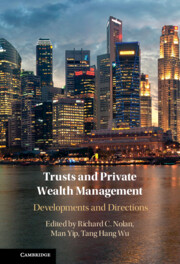Book contents
- Trusts and Private Wealth Management
- Trusts and Private Wealth Management
- Copyright page
- Contents
- Contributors
- Table of Cases
- Table of Legislation
- 1 Introduction
- 2 Family Trusts Today
- Part I The Rise of Asian Wealth
- Part II The Changing Legal Context
- 9 Trusts of Cryptoassets
- 10 Pragmatic Modernisation? Judicial Directions in Trusts and Wealth Management
- 11 Decision-Making in Trusts
- 12 Trustee Decision-Making in the Australian Superannuation Context
- 13 Trusts and UWOs
- 14 Constructive Trusts on Express Trusts
- 15 Abuse of Trust
- Index
14 - Constructive Trusts on Express Trusts
Principles under Threat
from Part II - The Changing Legal Context
Published online by Cambridge University Press: 08 December 2022
- Trusts and Private Wealth Management
- Trusts and Private Wealth Management
- Copyright page
- Contents
- Contributors
- Table of Cases
- Table of Legislation
- 1 Introduction
- 2 Family Trusts Today
- Part I The Rise of Asian Wealth
- Part II The Changing Legal Context
- 9 Trusts of Cryptoassets
- 10 Pragmatic Modernisation? Judicial Directions in Trusts and Wealth Management
- 11 Decision-Making in Trusts
- 12 Trustee Decision-Making in the Australian Superannuation Context
- 13 Trusts and UWOs
- 14 Constructive Trusts on Express Trusts
- 15 Abuse of Trust
- Index
Summary
New Zealand’s high rate of discretionary trust usage is mirrored by a significant number of attempts to penetrate the ring-fence created by trusts in order to provide some recourse for creditors, spouses and de facto partners of the settlors. This chapter considers a recent line of cases that has shown the courts’ willingness to recognise the application of a constructive trust to property already held subject to an express trust. The constructive trust is said to arise in response to the reasonable expectations of the third-party claimant of an interest in the property in return for various contributions made. This is so even despite one or more of the trustees having no knowledge of the expectations and/or the contributions. The courts have viewed themselves as departing from trust orthodoxy in these cases, saying that ‘traditional rules…must bend to the practical realities’. This paper will examine the cases and analyse whether they are in fact a departure from trust principles and whether such departure is justified. The author argues that there are two main objections to this development: one relating to the nature of the beneficial interest and the other to the remedy being awarded.
Keywords
- Type
- Chapter
- Information
- Trusts and Private Wealth ManagementDevelopments and Directions, pp. 264 - 284Publisher: Cambridge University PressPrint publication year: 2022

